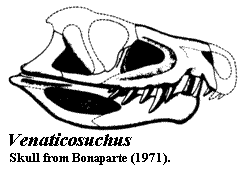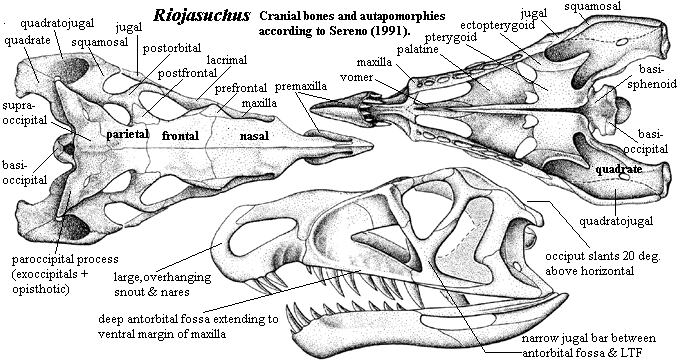
Ornithosuchidae
| Palaeos |  |
Archosauria |
| Vertebrates | Other Ornithosuchidae |
| Page Back | Unit Home | Unit Dendrogram | Unit References | Taxon Index | Page Next |
| Unit Back | Vertebrates Home | Vertebrate Dendrograms | Vertebrate References | Glossary | Unit Next |
|
Abbreviated Dendrogram
ARCHOSAUROMORPHA | `--ARCHOSAURIA |--Proterosuchidae `--+--Erythrosuchidae `--+--Euparkeriidae `--Crown Group Archosauria |--Ornithodira | |--PTEROSAURIA | `--DINOSAUROMORPHA `--Crurotarsi |--Phytosauridae `--Rauisuchiformes |--Rauisuchia | |--Ornithosuchidae | | |--Ornithosuchus | | |--Venaticosuchus | | `--Riojasuchus | `--+--Tarjadia | `--+--Prestosuchidae | `--Rauisuchidae `--Suchia |--Aetosauridae `--CROCODYLOMORPHA |
Contents
Overview |
 Venaticosuchus: V.
rusconii Bonaparte 1971
Venaticosuchus: V.
rusconii Bonaparte 1971
Range: Late Triassic (Late Carnian - Ischigualastan) of South America (Argentina)
Phylogeny: Ornithosuchidae : Ornithosuchus + Riojasuchus + *.
Comments: A typical ornithosuchid thecodont; very similar to Ornithosuchus (Late Carnian) and Riojasuchus (Rhaetian), from which it differed largely in minor details of the jaw and skull. The teeth are serrated, making them more efficient cutting tools, and each jaw carries two large canine-like teeth. Known from an incomplete skull and forelimb, some osteoderms, from the Middle Ischigualasto Formation. The lower jaw is 26 cm; total length was about 2 metres.
References: Bonaparte (1971) MAK030730.
 Riojasuchus:
Riojasuchus tenuisceps Bonaparte, 1967
Riojasuchus:
Riojasuchus tenuisceps Bonaparte, 1967
Range: Latest Triassic (Coloradean) of South America (Argentina)
Phylogeny: Ornithosuchidae : Venaticosuchus + Ornithosuchus + *.
Characters: large, overhanging snout & nares [$S91]; deep antorbital fossa extending to ventral margin of maxilla [$S91]; rugose postorbital crest (as in Ornithosuchus) absent [S91]; only narrow jugal bar separates antorbital fossa & LTF [$S91]; occiput slants at 20° above horizontal [$S91]; atlantal neural arch bases contact at midline [$S91]; vertebral intercentra present [P93]; ulnar & radial shafts slender [$S91]; proximal carpals elongate, with shaft-like midsection [S91]; metacarpal 1 robust, with asymmetrical condyles [S91]; calcaneal tuber with lateral side concave & medial side convex [P93]; rotary, crurotarsal ankle joint present [P93]; distal tarsal 3 transversely compressed [$S91].
Comment: Closely related to Ornithosuchus, but differs in the extreme dorsal position of the supraoccipital region and disappearance of the occipital crests (which are well defined in Ornithosuchus). Found in association with Hemiproterosuchus, Pseudohesperosuchus, and a tritylodontid.
References: Bonaparte (1971), Parrish (1993) [P93], Sereno (1991) [S91]. MAK030730, ATW040117.
Tarjadia: T. ruthae Arcucci & Marsicano, 1998. Known only from a few fragments -- probably an immature specimen. [AM98].
Range: Middle Triassic (Anisian or Ladinian) of South America (Argentina).
Phylogeny: Rauisuchia :: (Prestosuchidae + (Doswellia + (Poposauridae + Rauisuchidae))) + *.
Comment: If we had to guess, we'd make this a peculiar basal prestosuchid or close relative. [AM98] give Tarjadia no specific phylogenetic placement, but seem inclined to give it a more basal position. Accordingly, we have moved it slightly upstream in the cladogram. However, the placement is somewhat arbitrary.
Characters: skull roof bones with perforations for blood vessels, particularly near orbit [AM98]; skull sutures serrated and clearly visible [AM98]; frontals with strong ridges for laterosphenoid attachment [AM98]; internal surface of frontals suggests undivided nasal bulb with long olfactory channel [AM98]; parietals not fused & with strong sagittal crest between upper temporal fenestrae [AM98]; sagittal crest splits anteriorly to form anterodorsal margins of upper temporal fenestra [AM98]; postfrontal present & participates in orbital margin [AM98]; supraoccipital smooth, slightly concave & triangular, with point directed posteriorly [AM98]; ventrally, supraoccipital overlaps paroccipital processes & forms dorsal margin of foramen magnum [AM98]; exoccipitals fused to opisthotics to form anterolaterally projecting paroccipital processes [AM98]; paroccipital processes with deep otic notch close to suture with basioccipital [AM98]; notch with depression for vestibule and groove to tympanic recess [AM98]; vertebral centra laterally excavated & ventrally concave [AM98]; parapophyses anteroventrally directed & joined to (unfinished) diapophyses by horizontal ridge [AM98]; prezygapophyses & postzygapophyses flat, facing dorsally & ventrally, respectively [AM98]; neural spines tall, straight & expand distally to dorsoventrally flattened table with a small longitudinal groove [AM98]; osteoderms without strong processes or projections [AM98]; double row of thick, quadrangular osteoderms with one paramedian pair per vertebral segment [AM98]; rounded lateral osteoderms [AM98]; osteoderms & skull table bones with coarse, pitted ornament [AM98] osteoderms thickest centrally & medially, with spongy bone between two thin layers of compact bone [AM98].
Links: For some reason, no one has mentioned this genus on a web site except our esteemed Mikko Haaramo.
References: Arcucci & Marsicano (1998) [AM98]. ATW031226
| Page Back | Unit Home | Page Top | Page Next |
checked ATW040109
Using this material. All material by ATW is public domain and may be freely used in any way (also any material jointly written by ATW and MAK). All material by MAK is licensed Creative Commons Attribution License Version 3.0, and may be freely used provided acknowedgement is given. All Wikipedia material is either Gnu Open Source or Creative Commons (see original Wikipedia page for details). Other graphics are copyright their respective owners